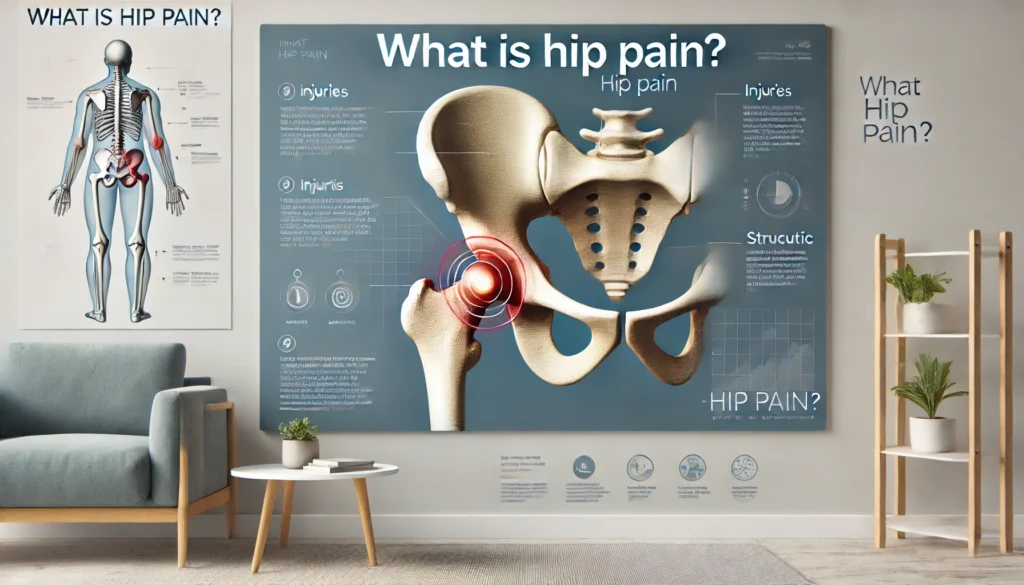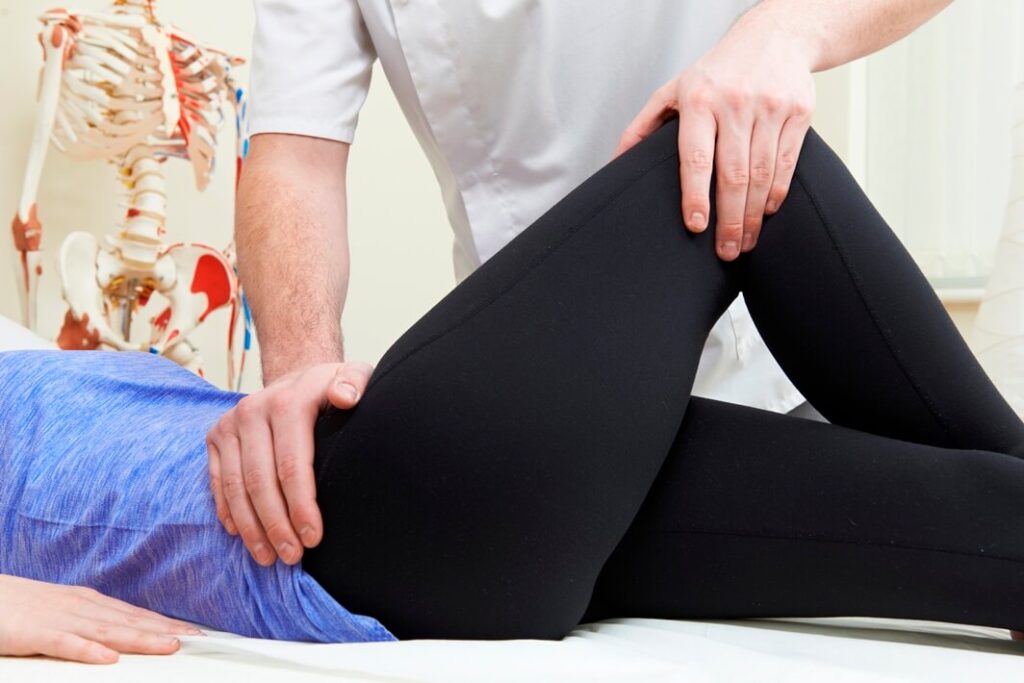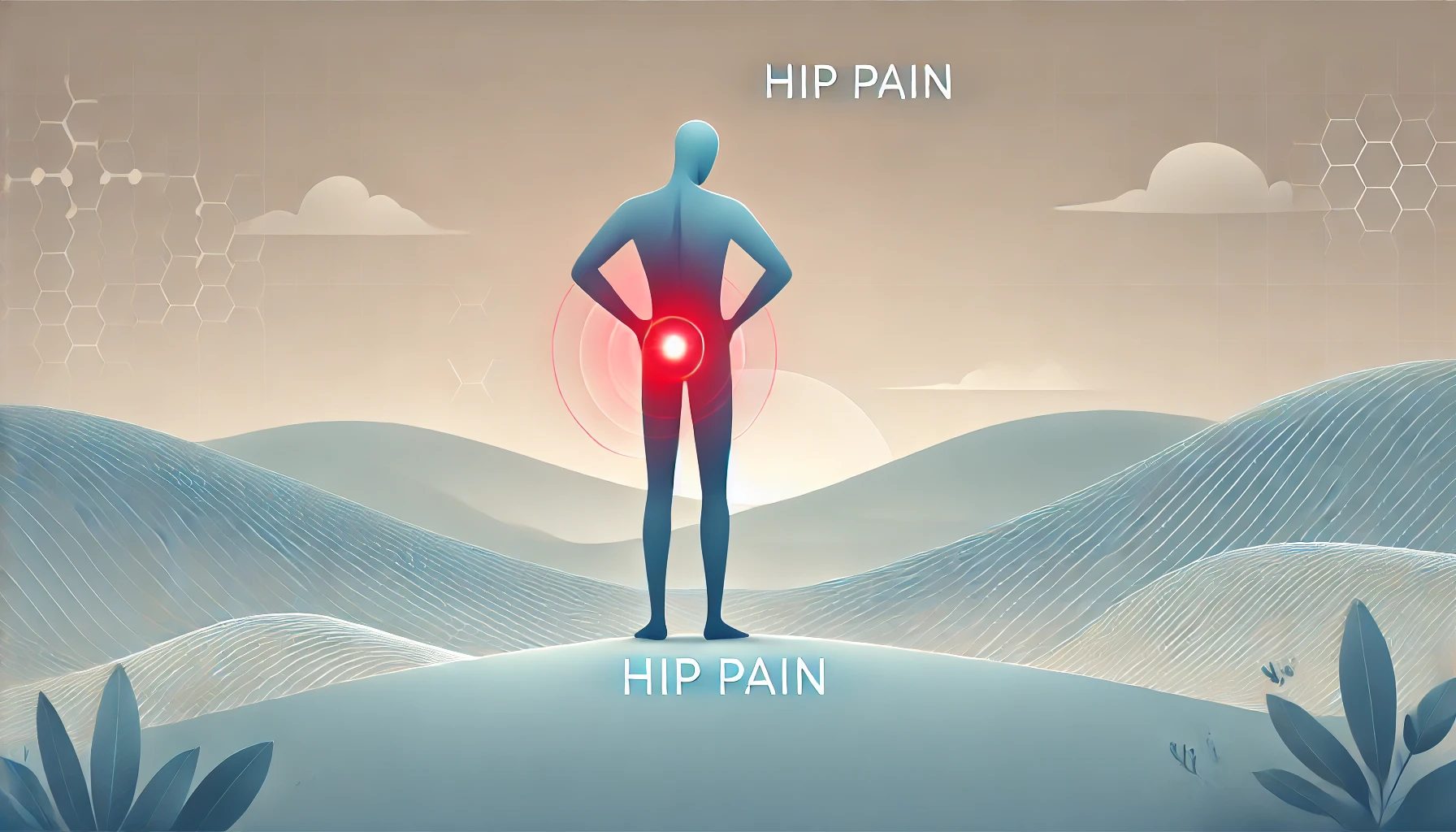Hip pain is a common issue that affects people of all ages, from young athletes to older adults. It can range from mild discomfort to severe pain that interferes with daily activities. Whether caused by injuries, arthritis, or structural abnormalities, understanding the root cause of hip pain is crucial for effective treatment and long-term relief.
In this article, we’ll explore the causes, symptoms, and best treatments for hip pain while providing practical tips to manage and prevent it.
What is Hip Pain?

Hip pain refers to any discomfort or soreness felt in or around the hip joint, which is one of the largest and most active joints in the body. It plays a crucial role in movement, balance, and weight-bearing activities. The pain can originate from muscles, ligaments, bones, or nerves in the hip area.
Common Symptoms of Hip Pain
The symptoms of hip pain vary based on its cause but may include:
✔ Aching or sharp pain in the hip joint
✔ Stiffness or reduced range of motion
✔ Pain that worsens with activity (e.g., walking, running, or standing for long periods)
✔ Swelling or tenderness around the hip
✔ Pain radiating to the groin, thigh, or lower back
✔ Clicking or popping sensation when moving the hip
If the pain persists for more than a few days, worsens over time, or interferes with daily activities, seeking medical attention is essential.
Common Causes of Hip Pain
Hip pain can be acute (sudden onset) or chronic (long-lasting). The most common causes include:
1. Arthritis
Arthritis is one of the leading causes of chronic hip pain, especially in older adults. Common types include:
- Osteoarthritis (OA): Age-related wear and tear on the hip joint cartilage.
- Rheumatoid Arthritis (RA): An autoimmune disease causing joint inflammation and pain.
- Ankylosing Spondylitis: A type of arthritis that affects the spine and hips.
2. Hip Bursitis
Bursitis occurs when the fluid-filled sacs (bursae) that cushion the hip joint become inflamed. This condition often results from overuse, repetitive motions, or direct trauma.
3. Hip Injuries
Injuries are a leading cause of hip pain, especially among athletes and active individuals. Common hip injuries include:
- Hip fractures (more common in older adults with osteoporosis)
- Hip labral tears (damage to the cartilage that stabilizes the hip joint)
- Hip dislocations (common in car accidents or sports injuries)
- Hip flexor strain (caused by overstretching or overuse)
4. Structural Abnormalities
Some people are born with hip conditions that increase their risk of pain later in life. These include:
- Hip Impingement (FAI): When bone overgrowth leads to abnormal hip joint contact.
- Developmental Dysplasia of the Hip (DDH): A condition where the hip socket doesn’t fully cover the ball of the thighbone.
5. Sciatica & Nerve Compression
Nerve-related hip pain can result from:
- Sciatica: Irritation of the sciatic nerve, causing pain that radiates from the lower back to the hip and leg.
- Piriformis Syndrome: A tight piriformis muscle compressing the sciatic nerve.
6. Muscle Strains & Tendonitis
Repetitive movements, improper posture, and sudden overuse of hip muscles can lead to muscle strains or tendon inflammation (tendonitis).
Effective Treatments for Hip Pain

The treatment for hip pain depends on the underlying cause. Here are the most effective methods:
1. Home Remedies & Self-Care
For mild hip pain, simple at-home treatments can provide relief:
✔ Rest: Avoid activities that worsen the pain.
✔ Ice Therapy: Apply an ice pack for 15-20 minutes to reduce swelling.
✔ Heat Therapy: A warm compress or heating pad can help relax tight muscles.
✔ Over-the-Counter Pain Relievers: NSAIDs like ibuprofen (Advil) or acetaminophen (Tylenol) can help.
✔ Gentle Stretching & Low-Impact Exercises: Helps maintain flexibility and prevent stiffness.
2. Physical Therapy & Exercise
A physical therapist can create a custom exercise program to strengthen the hip muscles and improve mobility. Recommended exercises include:
✔ Hip stretches to improve flexibility
✔ Low-impact activities like swimming or cycling
✔ Strengthening exercises to support the hip joint
3. Medications for Hip Pain
If pain persists, doctors may prescribe:
- Stronger NSAIDs or corticosteroid injections to reduce inflammation
- Muscle relaxants for nerve-related hip pain
- Hyaluronic acid injections for osteoarthritis-related pain
4. Hip Surgery Options
In severe cases, surgery may be required if other treatments fail. Common hip surgeries include:
🔹 Hip Arthroscopy: A minimally invasive procedure to repair cartilage tears or remove bone spurs.
🔹 Hip Replacement (Hip Arthroplasty): Recommended for severe arthritis or fractures.
🔹 Osteotomy: A surgical realignment of the hip joint to relieve pressure.
5. Lifestyle Changes for Long-Term Relief
✔ Maintain a healthy weight: Extra weight puts pressure on the hip joints.
✔ Wear supportive footwear: Proper shoes can improve posture and reduce pain.
✔ Practice good posture: Avoid prolonged sitting and ensure correct body alignment.
✔ Stay active: Regular movement prevents stiffness and strengthens muscles.
How to Prevent Hip Pain?
While some causes of hip pain are unavoidable, these preventive measures can help reduce your risk:
✅ Warm up before exercise and stretch afterward.
✅ Avoid prolonged sitting or standing in one position.
✅ Use proper lifting techniques to avoid straining the hip muscles.
✅ Incorporate strength training to support the hip joint.
✅ Stay hydrated to maintain joint lubrication.
When to See a Doctor for Hip Pain?
Seek medical attention if:
🚨 Your hip pain is severe or worsening over time.
🚨 You experience hip pain after a fall, injury, or accident.
🚨 You have difficulty walking, standing, or bearing weight.
🚨 You notice swelling, redness, or warmth around the hip.
🚨 Pain persists despite home remedies and rest.
In case of sudden, extreme pain or suspected fracture, visit the emergency room immediately.
FAQ’s
1. Can sitting for long hours cause hip pain?
Yes, prolonged sitting can lead to hip pain due to poor posture, muscle tightness, and reduced blood circulation. Sitting in an improper position can put excess pressure on the hip joint and surrounding muscles. To prevent this, take breaks, stretch regularly, and use an ergonomic chair for better support.
2. How can I tell if my hip pain is from arthritis or an injury?
Arthritis-related hip pain usually develops gradually and is accompanied by stiffness, swelling, and pain that worsens with inactivity. Injury-related hip pain, on the other hand, tends to be sudden, sharp, and linked to a specific incident, such as a fall or sports activity. Consulting a doctor for an X-ray or MRI can help determine the exact cause.
3. Is walking good or bad for hip pain?
Walking can be beneficial for mild hip pain caused by stiffness or arthritis, as it helps improve joint mobility and strengthen supporting muscles. However, if walking worsens the pain or is due to an acute injury, rest and medical evaluation are recommended before continuing any physical activity.
4. Can hip pain be a sign of a more serious condition?
Yes, persistent or severe hip pain could indicate a serious condition such as a hip fracture, nerve compression (sciatica), or an underlying medical issue like an infection or tumor. If the pain is intense, sudden, or accompanied by fever, numbness, or difficulty walking, seek medical attention immediately.
5. What is the best sleeping position for hip pain relief?
Sleeping on your back with a pillow under your knees or on your side with a pillow between your legs can help relieve hip pain by keeping your spine and hips aligned. Avoid sleeping on the painful side, and consider using a supportive mattress to reduce pressure on the hip joint.
Final Thoughts on Hip Pain
Hip pain can disrupt your daily life, but the good news is that most cases can be managed with proper treatment and lifestyle adjustments. Whether your pain is due to arthritis, an injury, or muscle strain, taking proactive steps can help you stay mobile and pain-free. If your hip pain persists or worsens, consult a healthcare provider for a thorough evaluation and personalized treatment plan. Early diagnosis and treatment are key to maintaining healthy, pain-free hips for years to come!
Related Post
- mylovelyfurryfriend discover expert tips on dog health
- Infectious Diseases Updates – Stay Informed, Stay Protected!
- Wegovy For Weight Loss – A Breakthrough in Managing Obesity!
- Emergency Medicine Forum – A Hub for Fast-Paced Knowledge, Support & Updates!
- Pediatrics Discussions – Insights, Challenges, and Expert Advice for Better Child Health!





Leave a Reply